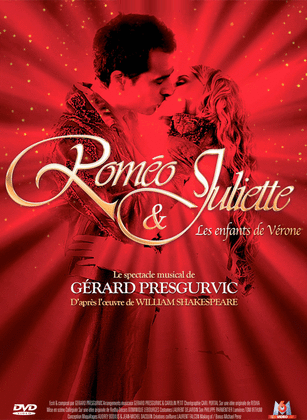
Roméo & Juliet

Romeo and Juliet, a fatal drama is brewing for these teen-aged lovers, born under the worst of stars. And nothing other than their deaths will appease the inexpiable hatred that their noble families vow each other. Destiny will scoff cruelly at their love, leading them to death. They embody all the tragedy of youth rebelling in the name of love against the conformity and stupidity of the world of adults.
This emblematic story is filled with all the timeless ingredients of the best plots: thwarted love, secret marriage, magic potion, feigned death, chance, fatal misunderstandings…
The lovers of Verona have acquired immortal status, thanks, of course, to Shakespeare’s immortal words but especially to the obstinate force of their love, which transcends death. Hatred will always find a thousand arguments to feed on itself. But when it happens to destroy the loveliest flowers of youth, the reasons for hating become utterly absurd.
Clearly, this message has lost none of its topicality. In any case, that is what Gérard Presgurvic thought when he,
in turn, decided to tackle this myth.
Roméo & Juliet
The Lovers of Verona
Romeo and Juliet, a fatal drama is brewing for these teen-aged lovers, born under the worst of stars. And nothing other than their deaths will appease the inexpiable hatred that their noble families vow each other. Destiny will scoff cruelly at their love, leading them to death. They embody all the tragedy of youth rebelling in the name of love against the conformity and stupidity of the world of adults. This emblematic story is filled with all the timeless ingredients of the best plots: thwarted love, secret marriage, magic potion, feigned death, chance, fatal misunderstandings… The lovers of Verona have acquired immortal status, thanks, of course, to Shakespeare’s immortal words but especially to the obstinate force of their love, which transcends death. Hatred will always find a thousand arguments to feed on itself. But when it happens to destroy the loveliest flowers of youth, the reasons for hating become utterly absurd. Clearly, this message has lost none of its topicality. In any case, that is what Gérard Presgurvic thought when he, in turn, decided to tackle this myth.
“For never was a story of more woe than this of Juliet and her Romeo.”
The action takes place in Verona, where two great families, the Capulets and the Montagues, have vowed each other a mortal hatred for years. Exasperated, the Prince decrees a formal ban on fighting in his city, on pain of death. During this time, the sweet young Juliet, daughter of the Capulet clan, is nervously preparing for the great ball that her parents have organized to introduce the suitor they have chosen for her, Count Paris. Her destiny awaits her. Romeo, the romantic son of the Montague clan, sneaks into the party with his lifelong friends Benvolio and Mercutio. It is love at first sight. The young people are immediately bewitched by the other’s beauty but they are brutally separated by Tybalt, Juliet’s cousin, who has recognized Romeo. In spite of the devastating discovery of their respective identities, Romeo later comes to Juliet’s balcony, and they swear eternal love. After a final oath, Romeo goes in search of Friar Lawrence, whom he asks to marry them. In the hope that this union will reconcile the two enemy clans, his confessor agrees to marry them in secret. Bursting with happiness, Romeo finds his friends Benvolio and Mercutio in the main piazza of Verona where they run into Tybalt, who has been looking for Romeo since his intrusion at the Capulets’ ball. Romeo refuses to fight, and an indignant Mercutio takes up the challenge. When Romeo tries to intervene, Mercutio is mortally wounded. Mad with grief, Romeo catches up with Tybalt and kills him. Both grieving families demand vengeance from the Prince, who, out of a concern for justice, spares Romeo’s life but sentences him to exile in Mantua. After spending the night together, Romeo and Juliet have trouble parting. After he has left for Mantua, Juliet laments, and her father, worried about her sorrow, decides to move her wedding with Count Paris to the next day. She runs to Friar Lawrence who offers her a potion that will give her the appearance of death for 48 hours—just enough time for the priest to warn Romeo of the ruse and go together to deliver her. A grateful Juliet obeys him and bravely drinks the potion. The next morning, the whole family is weeping over the death of Juliet, who will be placed in the Capulet mausoleum. Unfortunately, the faithful Benvolio witnesses the scene and rides off to Mantua to inform Romeo. Friar Lawrence’s messenger will not arrive in time to warn Romeo, who, beside himself with grief, rushes back to see his beloved, whom he believes dead. After a final declaration of love, he swallows a poison that will enable him to join her in death. Upon awakening from her sleep and discovering her dead lover, Juliet cannot bear to outlive him. She takes his dagger and, after a last kiss, kills herself on his body, joining him for eternity. When he discovers them, Friar Lawrence loses his faith, whereas the warring families, overcome with guilt, make their peace over the dead bodies of their children whom they will bury together.
Gérard Presgurvic
THE STRENGTH OF A PASSIONNATE AUTHOR
Throughout his career, Gérard Presgurvic has always been fascinated by the union of music and image. Initially tempted by the movies, he made several short features and composed scores for a few films (Moitié-moitié, La Vérité si je mens!…) and TV series (Pause Café, Da Costa…), before turning to songwriting. After the outstanding cult success of «5 heures du mat» by Chagrin d’Amour, he composed numerous hits for leading French singers including Patrick Bruel, Florent Pagny, Mireille Mathieu, Henri Salvador, Liane Foly… With his first musical show, Romeo and Juliet, Gérard Presgurvic achieved a long-standing dream: he finally succeeded in combining his two artistic passions,theater and music, and from this marriage was born a phenomenal success. Opening in January 2001 at the Palais des Congrès in Paris, Romeo and Juliet went on to draw more than 2 million spectators in France while the disk broke sales records with more than 6 million CDs and DVDs sold. His show was crowned by wonderful success in foreign countries.
After Montreal, Quebec, Ottawa, London, Antwerp, Amsterdam, Moscow, Budapest, Vienna, Romeo and Juliet eventually charmed Asia where a triumphant tour took place, particularly in Seoul and Bussan in South Korea and in Taipei in Taiwan in 2007. It has been performed in Mexico since the beginning of August 2008. A second tour was scheduled in Asia for the end of 2009. The show will open in January 2009 in Romania, in September in Slovakia and will also soon be performed in Singapore, China, Japan, Hong Kong, Germany, Prague, Italy, Dubai. In 2003, after obtaining the rights from the eligible American parties, Presgurvic launched into the musical adaptation of Gone with the Wind, Margaret Mitchell1s world-famous bestseller. Faithful to his innate sense of popular feeling and to the spirit of its author, his new show, which attracted more than 600,000 spectators in less than a year, was a new hit. After triumphing in Paris and the provinces, Gone with the Wind had considerable success on DVD , spending several weeks at the top of the charts. The show is currently being prepared for foreign productions. Gérard Presgurvic is currently preparing Gone with the Wind for foreign productions and this show is sure to enjoy the same success as Romeo and Juliet has. The first countries who will have the honour of hosting the new show are Hungary and in Asia at the beginning of 2010. Romeo and Juliet has celebrated its tenth anniversary with a revival by a comeback in Paris in 2010, and Gerard Presgurvic’s new musical is scheduled for the end of 2014.










